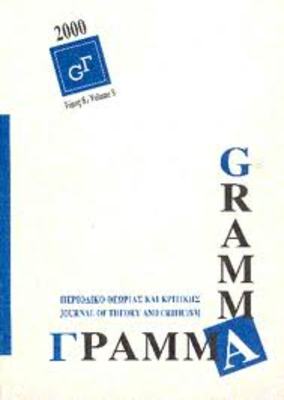The Unapologetic Seduction of Form : texts as pretexts in postmodern versions of(f) Greek tragedy
Part of : Γράμμα : περιοδικό θεωρίας και κριτικής ; Vol.22, No.1, 2014, pages 53-62
Issue:
Pages:
53-62
Author:
Abstract:
This paper explores the ways in which contemporary directors-adapters of Greek tragedy have confronted the ancient text, tracing a propensity for an ambivalent —if nonchalant — attitude towards the past and its infiltration into today's sensibilities. It points out the need for both artists and spectators to look deeper into the classical work in order to develop a critical stance vis-à-vis the assumed textual significance, understood as the impact of the source play to its original audience. Indeed, the notions of stature, communion, and transcendence, inherent in the "Classics" are often buried or rendered irrelevant in various productions of strong formalist foundations and markedly visual emphasis, which end up deflating, depoliticizing, and ultimately devaluing the plays' dialectic as well as affective nature. Laying out the premises whereby the application of form can bring fascinating results in performances of Greek tragedy, in the end, the paper argues that the dangers embedded in the overly aestheticized mindset of avant-garde directors should also be viewed and investigated within the framework of a broader unease towards the modern relevance and adapt-ability of the ancient text.
Subject:
Subject (LC):
References (1):
- Baeten, Elizabeth M. The Magic Mirror: Myth 's Abiding Power. Albany: State U of New York P., 1996. Print.Barthes, Roland. "Putting on the Greeks." Critical Essays. Trans. Richard Howard. Evanston: Northwestern UP, 1979. Print.Bogart, Anne. A Director Prepares: Seven Essays on Art in Theatre. New York: Routledge, 2001. Print.Brantley, Ben. "The Bacchae: God vs. Man in an Open-Air Fight." New York Times 25 Aug. 2009: C5. Print.Campbell, Peter. "Postdramatic Greek Tragedy. " Journal of Dramatic Theory and Criticism 25 (Fall 2010): 55-74. Print.Eliot, T.S. The Sacred Wood. New York: Alfred A. Knopf, 1921. Print.Golder, Herbert. "Geek Tragedy?: Or, Why I'd Rather Go to the Movies." Arion, Third Series 4.1 (1996): 174-209. Print.Gussow, Mel. "THEATER: ALCESTIS." New York Times 21 Mar. 1986. Print.Hutcheon, Linda. A Poetics of Postmodernism: History, Theory, Fiction. New York: Routledge, 1988. Print.—. A Theory of Adaptation. New York: Routledge, 2006. Print.Marranca, Bonnie, and Gautam Dasgupta, eds. Conversations on Art and Performance. Baltimore: Johns Hopkins UP, 1999. Print.Mee, Charles. "The Theatre of History." Conversations on Art and Performance. Ed. Bonnie Marranca and Gautam Dasgupta. Baltimore: Johns Hopkins UP, 1999. 182-93. Print.Mendelson, Daniel. "The Bad Boy of Athens." The New York Review of Books 13 Feb. 2003: 24-29. Print.Nietzsche, Friedrich. Birth of Tragedy and Other Writings. Trans. Ronald Speirs. Cambridge: Cambridge UP, 1999. Print.Pavis, Patrice. "The Classical Heritage of Modern Drama: The Case of Postmodern Theatre." Trans. Loren Kruger. Modern Drama 29.1 (1986): 1-22. Print.Read, Herbert. The Meaning of Art. London: Faber and Faber, 1931. Print.Revermann, Martin. "The Appeal of Dystopia: Latching onto Greek Drama in the Twentieth Century." Arion, Third Series 16.1 (2008): 97-118. Print.Sontag, Susan. "On Art and Consciousness." Performing Arts Journal 2.2 (1977): 25-32. Print.Terzopoulos, Theodoras. Interview by Antigoni Karali. "Tragedy Needs Stature" ["Θέλει παράστημα η τραγωδία"]. Ethnos 29 June 2008. Print.




